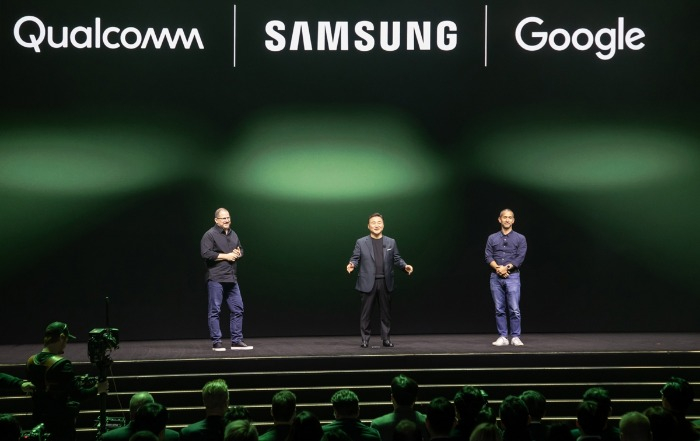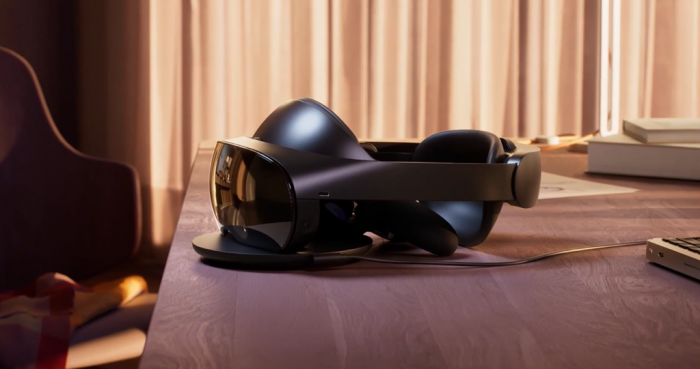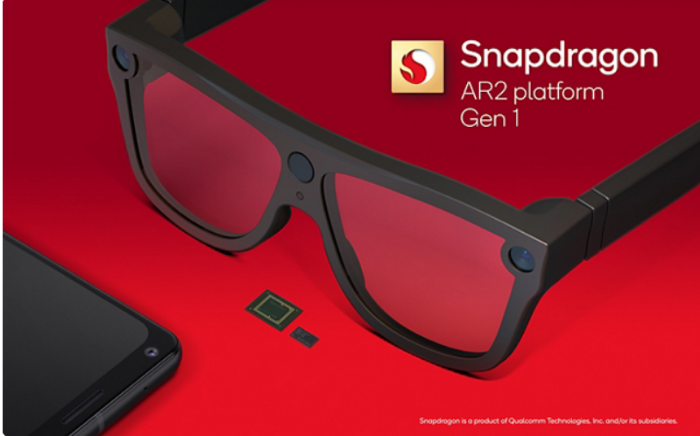Korean chipmakers
Samsung takes steps toward XR device processor chips
The No. 1 memory chipmaker may challenge Qualcomm, Google in the XR chip market, while teaming up to develop XR devices
By May 28, 2023 (Gmt+09:00)
2
Min read
Most Read
LG Chem to sell water filter business to Glenwood PE for $692 million


KT&G eyes overseas M&A after rejecting activist fund's offer


Kyobo Life poised to buy Japan’s SBI Group-owned savings bank


StockX in merger talks with Naver’s online reseller Kream


Meritz backs half of ex-manager’s $210 mn hedge fund



Samsung Electronics Co. has been taking steps to develop extended reality (XR) device processor chips to challenge Qualcomm Technologies Inc. and Google Inc. in the fast-growing market, according to industry sources on Sunday.
The South Korean company's plans to venture into the XR device chip market are now taking shape, the sources said, without giving further details.
The move comes after Samsung's Mobile eXperience (MX) division early this year unveiled a plan to develop XR devices, which the company sees as a new cash cow.
Samsung’s System LSI Division, the chip giant’s only fabless division, produces the Exynos series of processors embedded in smartphones, cars and wearable devices.
An Exynos processor acts as a central processing unit (CPU). But the systems-on-a-chip series are not designed for XR gadgets.
Samsung is mulling whether to develop new processing units for extended reality products or modify the existing Exynos line of processors to suit XR devices.
The extended reality sector encapsulates virtual reality, augmented reality and mixed reality.
XR devices like smart glasses create immersive experiences that enable 3-D virtual meetings and live translated captions of foreign languages.
Their CPUs gather and process sensor data; measure and track a user’s body and eye movements; and estimate the user’s location.

Counterpoint Research forecast that XR device shipments would jump sixfold to 110 million units by 2025 from 18 million units in 2022.
Their market value is projected to grow to $50.9 billion by 2026 from $13.9 billion in 2022, according to IDC, another market tracker.
Global tech giants are stepping up their game to develop new XR devices for broader everyday use.
Last November, Meta Platforms Inc. released a new high-end mixed-reality headset, Meta Quest Pro.
Facebook's parent company has sold more than 10 million units of its Meta Quest headset worldwide.
Apple is expected to unveil its own VR headset, tentatively named Reality Pro, at its annual Worldwide Developer Conference (WWDC) 2023 on June 5.
It is known to have equipped its latest VR headset model with its systems-on-a-chip semiconductor Apple M1.

Qualcomm is at the forefront of XR device chip development. In November 2022, it unveiled its latest series of XR chips, Snapdragon AR2. The systems on a chip are designed for AR glasses.
The company said more than 10 XR device makers were developing products based on AR2 chips.
Amid the heated rivalry among XR chip developers, some of them have teamed up to develop XR headsets and other products.
Earlier this year, Samsung said it would collaborate with Qualcomm and Google to develop XR devices, independently of its System LSI Division within the company.
Write to Jung-Soo Hwang at hjs@hankyung.com
Yeonhee Kim edited this article
More to Read
-
 Korean chipmakersSamsung unveils Exynos Modem 5300 to rival Qualcomm, MediaTek
Korean chipmakersSamsung unveils Exynos Modem 5300 to rival Qualcomm, MediaTekMar 28, 2023 (Gmt+09:00)
1 Min read -
 Korean chipmakersSamsung’s new Exynos chipset enables short-range wireless connectivity
Korean chipmakersSamsung’s new Exynos chipset enables short-range wireless connectivityMar 21, 2023 (Gmt+09:00)
2 Min read -
 Korean chipmakersSamsung unveils new Exynos mobile chips for midrange smartphones
Korean chipmakersSamsung unveils new Exynos mobile chips for midrange smartphonesFeb 24, 2023 (Gmt+09:00)
2 Min read -
 Tech, Media & TelecomSamsung’s next frontier: XR in partnership with Qualcomm, Google
Tech, Media & TelecomSamsung’s next frontier: XR in partnership with Qualcomm, GoogleFeb 02, 2023 (Gmt+09:00)
3 Min read -
 Tech, Media & TelecomSamsung touts latest Exynos 2200 chip as mobile game changer
Tech, Media & TelecomSamsung touts latest Exynos 2200 chip as mobile game changerJan 18, 2022 (Gmt+09:00)
3 Min read
Comment 0
LOG IN


